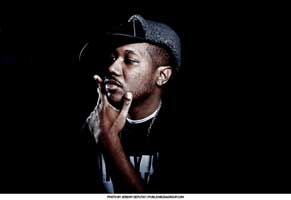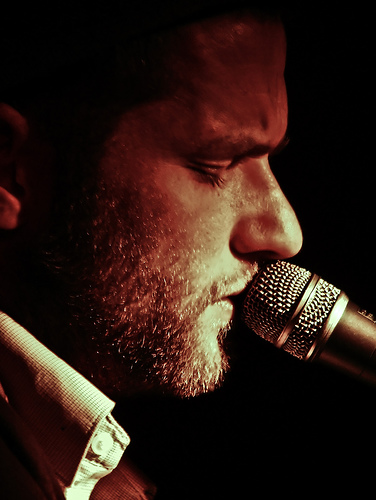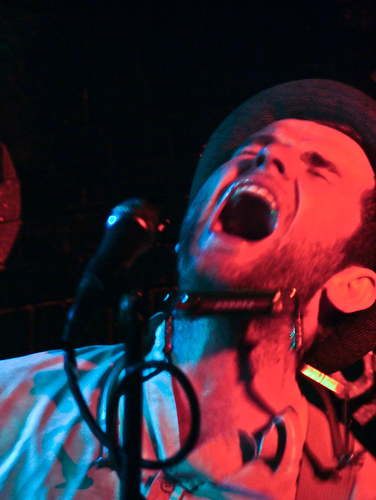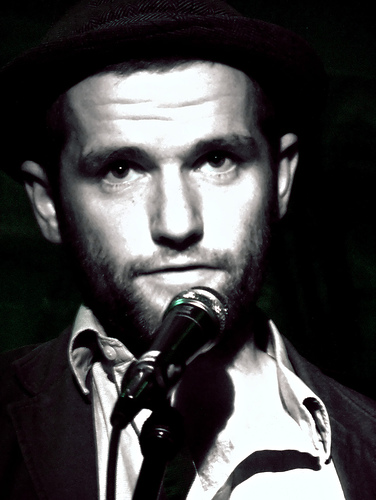
In September’s version of “What I’m Hearing,” I reviewed the solo debut album from eLZhi, The Preface. Late last month, I had a chance to sit down and chat with the up and coming Detroit rapper who has been in the game since the ’90s about the state of hip-hop, his progression as an artist, remix culture and politics. Enjoy!
AC: How are you doing? Where you at today?
EL: I’m over at my friend Phat Kat‘s house. Chillin over here, writing rhymes.
AC: Up in Detroit?
EL: Yea, we’re in Detroit right now.
AC: Start off easy…what’s the meaning of your name, and you have stressed capitalization in it. What’s the importance of that?
EL: The L and the Z are capitalized in my name because that’s what I used to go by before eLZhi, LZ. How I even got eLZhi was trying to spend out LZ, spelling it out wrong and it was elzhi and I was like, “Yea, I like that, I’m going to keep that.” At first there wasn’t a meaning to it, I didn’t know what it meant. Then I got into Slum Village and my boy Baatin was really big on Hebrew and was learning the Hebrew language and actually broke my name down to me and said my name means “God’s Spirit.” So the “el” is God and the “zhi” is 7 and 7 is a spiritual number.
AC: Talk a bit about growing up in terms of your relationship with music. What were some of your early influences?
EL: Before I started writing rhymes, my influences were things my Mom used to play. She used to play a lot of Motown records from Marvin Gaye to Stevie Wonder, Luther Vandross, things of that nature. My auntie used to play Planet Rock, stuff like Jack the Ripper, LL. I got my first cassette tape from my Grandfather. He bought me a walkman and a cassette tape and it was like Fat Boys. So from there I was in love with the art form and started hearing a little Rakim, hearing a little Special Ed, a little Ice Cube and I was just gone after that, I knew it was something I wanted to pursue and be a part of.
AC: When did you first start officially rapping and writing rhymes and what were your initial experiences like both live and in the studio?
EL: I started writing rhymes at the age of 8. Things like “I figga like a nigga/pop the gun and hold the trigger/the gun is loaded 12 gauge I hold it/the bomb exploded one sucker corroded/and I just won’t stop til my lyrics pop/making sure that you weak and my opponent gets dropped.” That’s something I wrote when I was 8. My first rhyme that I wrote was actually off the top of my head. Another thing that kept me going on and on was one of my family members, she used to always want me to freestyle in front of people she brought around the house. By her pumping me up like that, it really made me want to keep going with it.
The first time I got in the studio it was kinda weird. Usually you’re just rapping on the streets, rapping in the hallways, lunchrooms, whatever, but when you put your voice to that mic, sometimes you don’t sound exactly how you sound to yourself when you’re just talking. I had to really learn how to control my voice, my breath control when I was in the booth, I was out of breath a lot of times, it’s just a whole different world. That’s really the test to see if you want to be an MC is mastering that booth, and mastering how you sound on the mic and then from there mastering how you sound on the stage. When I finally got it down pat, I was definitely satisfied with the outcome.
AC: You’ve done a lot of collaboration in your career with other artists. Talk about how you identify artists you’d like to work with, how that process comes about and what this constant collaboration has done for your career and your style.
EL: Basically, if I want to collaborate with someone, it’s cause I feel what they’re doing. Collaborations that came about in the past with us getting involved with people already in the industry, we just let the label know, cause at the time we were working with Capitol. I’m speaking on Slum Village, by the way, for those who don’t know. But at the time we were working with Capitol and we let them know that we were trying to get at Kanye. Now Slum worked with, before I got in the group, a bunch of cats from Busta Rhymes to Pete Rock to Kurupt to Common, Q-Tip, the whole nine. And those were strictly off the strength that they liked Slum’s music. You listen to the Detroit Deli album, I was a part of the group at that time, and we got Kanye, mainly because we really identified with his music and thought he was live with it, so the label hooked up the situation and he was actually in the booth. And just to see this guy in the studio, doing his thing, happy about making music and enjoying increasing the quality of his craft, it was inspiring, it made me want to take it to the next level. In these days and times, I’m just trying to get mine and I think about that from time to time and use that as inspiration to push forward.
AC: You’ve been a longtime artist now on the Detroit scene, and you were on the scene long before Eminem was, who in a way has become one of the biggest pop rap names out of Detroit. Have you noticed a difference in the feel and quality of the scene from before and after his discovery, and would you say by extension that artists from Detroit are tired of being associated with him?
EL: The scene was two totally different eras. Back then, hip-hop was a little bit more live, even to people in the mainstream because you could turn on BET and see Rap City and actually look at a Hieroglyphics video or a Black Moon video. Hip-hop was alive because you didn’t really have to go digging. Now you have to go digging. You’re not even really seeing videos from some of the illest artists that are out today, so it’s a totally different thing. It was strictly just on some hip-hop stuff, people werer just trying to make classic records, they weren’t even thinking about the radio.
After Eminem blew up, hip-hop was changing, so it was people back then doing it to make classic records, and now they’re trying to make classic records while at the same time making that radio hit so they can get on like that. But one thing I do like about it, is that in Detroit, I can’t speak for nowhere else, just us going off into that music for the masses or whatever, it’s a good thing and a bad thing. But I focus on the good thing. It made a unity happen in Detroit that wasn’t there before. You got cats like Trick Trick rapping with Royce, Trick Trick rapping with eLZhi, elZHi rapping with Stretch Money, it formed a unity. As far as Eminem, we never get tired of that. Eminem making it was like everyone else making it from that era and he set a real good example of how to come out of the hood and do good, so we’re definitely not mad at that. He represents all of us like we represent him.
AC: You just released The Preface, and I’ve been listening to this a lot…the album is hot. It was a long time coming for you to release an official solo album debut. Why did you wait so long and what was the process for you working on this album?
EL: It’s been a long time coming. The reason it took so long was I had to make sure my business was right. Slum Village as well as eLZhi was going through some label troubles, but everything is all good now. I did the album in like 3.5 weeks and what happened was I took a CD overseas to sell when I went on tour and that CD has become known as the Euro Pass. Really I was just taking it over there to sell, I didn’t know it would do as good as it did, as far as being on the internet like it was, and I just wanted to take control of the buzz and strike while the iron was hot. They basically told me I had this amount of time to work on a record, and if I didn’t, I would have to wait to put out a record after Black Milk, so I was like let me just get in the studio and buckle down and make some music from the heart but at the same time be snappy about it because I only had a limited amount of time to do it so The Preface was born.
AC: Was everything on The Preface original material for the album or did you take anything from your previous work?
EL: I took maybe three or four songs from the Euro Pass that circulated around the internet. Reason being for that is that these were songs people were expressing to me through Myspace that they enjoyed and I’m like, “I’m not going to take those away, especially if I can put it on another album and make it sound better than it did, basically breathe more life into it. So I didn’t want to do that to the fans who had that record, but at the same time I didn’t want to take everything off the Euro Pass and put it on The Preface cause I did want to make it a different record. So besides those 4 cuts, everything else is original.
AC: Is it true that most of the production on this album comes from Black Milk?
EL: Yea, most of the production is done by Black Milk, there’s a couple tracks done by my DJ who goes by the name Andreas or DJ Dez, and I got another one from T3 and another one was done by this dude named Demark Vessey. So I just wanted to give some new up and coming talent a chance to shine.
AC: What was working with Black Milk like and how did his musical ideas influence the album?
EL: To be perfectly honest with you, at the time, Black was working on his album (Tronic), so all I really did was take the Black Milk beats that were open, I took the best Black Milk beats I could find and put it all together and made the record. He would come in from time to time and put his ear on it, tell me what he thought I should keep, let me know how he should approach the record, change the drums or something. But working with Black is always an honor because we appreciate each other’s craft and we recognize the real and are coming together for one common cause, to breathe life into the game, so it’s always cool working with Black.
AC: What I like a lot about this album is that there’s a lot of variety on it in terms of the sound. You have harder hitting songs like “D.E.M.O.N.S.” and “Hands Up” and then you have more playful songs like “Guessing Game” and “Colors,” to the two really laid back ones that I’m enjoying the most, “Transitional Joint” and “Save Ya.” What are your favorite cuts and can you talk about your lyric writing process and how you incorporated all those different styles?
EL: Some of my favorite songs on The Preface. One being D.E.M.O.N.S. I was actually in Cali when I thought about this, I thought, “it’d be crazy if I broke the world down to acronyms and just made the D the E the M the O and the N mean something different throughout the whole verse not missing a beat,” so I was proud of myself when I did that one. Another record is the “Guessing Game.” For one, I’ve never heard anybody even attempt to do a concept like that. That came to mind when I was rapping in the backseat of this van. Me, Fat Kat and T3 were on tour and it just popped in my head like one of the lines I have on this song called “Fire,” where I was saying “technology,” and just the way that I played with the word “tech” and “nology” made me come up with the idea like what if I did this with words and tricked everybody into thinking I was going to say one thing and then I didn’t? So that’s how that concept came about and I’m glad I put that on the album.
Songs like “Talking in My Sleep,” I’m proud to say that’s a visual song even though it’s something made up, that’s something I imagined and put to paper so people could visualize it. “Save Ya,” “Transitional,” “Hands Up,” my writing process just varies. There’s times where I may write stuff down, but that’s rare. If it’s a deep concept and I’m trying to get real visual with you, so it plays in your mind like a movie, sometimes I write those down but other than that, all my rhymes are stored inside my memory bank, and I may write it in my mind before I go to the studio, or I might write it in the studio to a beat or scat a bit in the booth, so there’s so many different ways I approach writing.
AC: Going to broader industry questions, you worked extensively in mix tapes before you released this album. What do you think of the current state of the music industry and where do you see it going?
EL: I see the music industry being on the downlow tip. I see people buying records from the internet. I see the internet as the new streets. I remember back in the day being in New York and seeing promotional vans and people just stopping on the side of the street and opening up the back doors with music banging from the person they were promoting, while a street team was out in front of the van slinging fliers and giving singles away. I can recall when Eminem, before he put out his first record, he had that song “I Just Don’t Give a Fuck,” and his promotional tour was passing VHS tapes with the video on there out in the club. But now it ain’t like that anymore. The internet is so big that people are promoting what they need to promote on the internet. I just see music as being on the downlow where it’s sad to say that you see Tower Records folding here, a Virgin Records closing there and music stores closing in general. But I see music sales going straight to the internet.
AC: You were talking earlier about two different generations in terms of hip-hop in Detroit, but overall in hip-hop, how do you view the genre as changing, and do you view these as positive or negative changes?
EL: I see the genre changing in that rock groups trying to incorporate rap and rap groups are trying to incorporate rock. And to me that’s not a bad thing, because it’s all about evolving and changing. I’m eclectic. I like Bon Jovi, I like Jimi Hendrix, Miles Davis, so I’m all for hip-hop changing and flipping, as long as the music sounds good, I don’t have a problem with it.
AC: Following The Preface here, do you see yourself working on some more solo stuff or going back to collaborations for the next part of your career?
EL: Well I’ve got a mixtape coming out in December, I like to give a shout out to one of the illest rappers who’s still breathing right now, Nasir. I’ve got a record where I’m giving tribute. I actually got the idea from my boy DJ House Shoes and the name of the mixtape is Elmatic and it’s a tribute to the classic album Illmatic that Nas put out so in a way it’s me giving my own personal hip-hop honor to him, so I’m getting that mixtape ready, hopefully it should be ready in December. I’m working with Fat Kat on his new record, I’ll be on like 80% of that record. I’m also working with T3, we’re doing a mixtape for DJ Who Kid right now but at the same time me and Royce are getting our thoughts together for our collaboration, but at the same time I’m still planning on putting out an album after the mixtape called The Feed and that’s going to be bigger and better than The Preface.
AC: You’re a busy man.
EL: It’s about that time. We’re living in a whole different era right now where we need to be in peoples’ faces and we gotta work overtime. But to me it doesn’t even feel like work cause I love to do what I do, but yea you have to stay busy if you want to stay relevant.
AC: What has your career in hip-hop taught you about life and what has life helped you learn to enhance your hip-hop?
EL: What hip-hop taught me was just to go hard at everything I do. Taake it to the next level with everything I do in my life. And my life influenced my hip-hop because everytime I pick up the pen I write about something that’s happening in the street or happening in my life, personal things, my wants, my fears, so it’s always influencing me in terms of what I write in my verses and the concepts that I think about. So you can’t help but let it influence you like that because you live in it everyday and if you rap about it from the heart it’s gonna automatically come off that way.
AC: A lot of bands outside of hip-hop, most notably Radiohead, have started letting fans remix their songs on the internet. Do you view that as a positive form of interaction with fans, and would you let your fans remix your cuts?
EL: There’s been a couple of times when I got my stuff remixed. This is what happened. My record came out and somebody took one of my songs and put their verse at the end of the song, then put that version in with the album and had it where people could download it. So when certain people downloaded the record, the version with that person rapping on my record is the version they got, so they’re thinking that’s what the record sounded like. I don’t agree with that, but as far as people wanting to put their spin on it or be heard or whatever, it’s all fun, it’s all good, I’m not mad at it, go for theirs is what I say.
AC: To get a little political with you, we’re in a massively important election. Have you been following it and do you have any thoughts about what direction our country needs to head in?
EL: I’ve been following it a little bit. It’s time for a change, my people here in the D that aren’t into this rap game and work regular jobs, there’s cats getting laid off, can’t find jobs here. So that needs to change. The economy as a whole, I mean gas is starting to look a little better, but man, it was even better than this at one point and we’re just happy it’s at this level now, but it was worse only a few weeks ago, maybe a month ago. The economy as a whole needs to have a makeover and I just feel it’s time for that change, and like you say man, this is a real important election and everyone needs to voice their opinion and vote, and I’m voting for Obama, and that’s just how it is.






